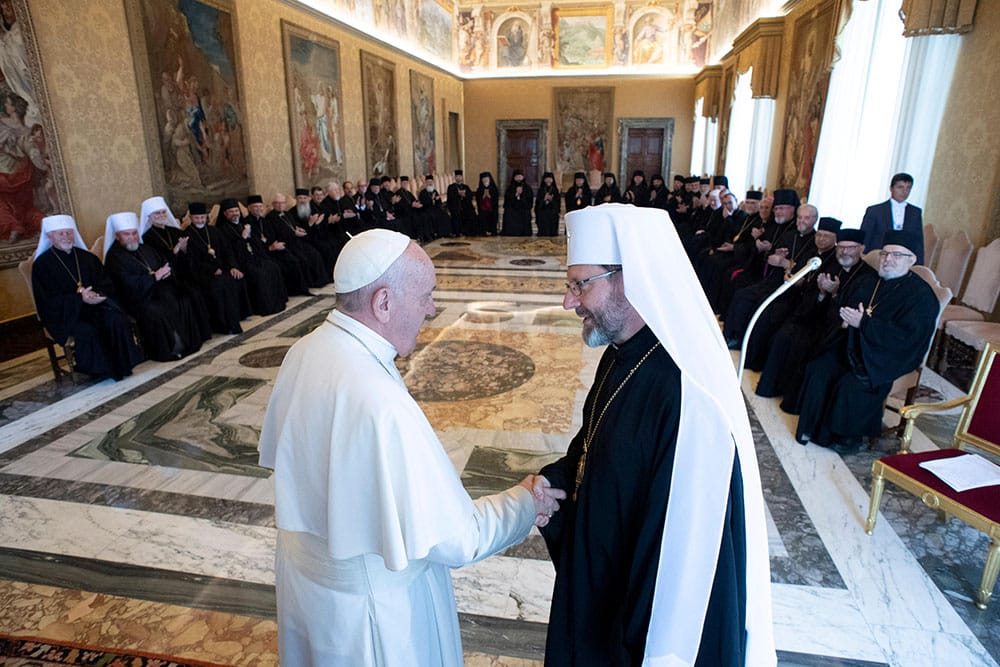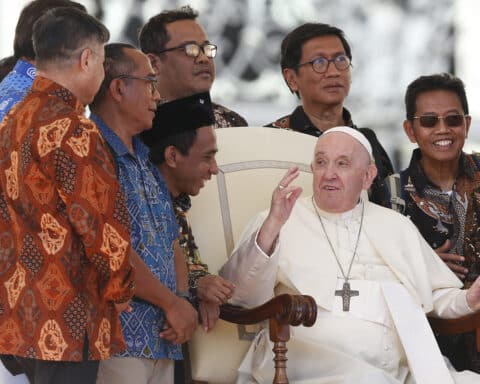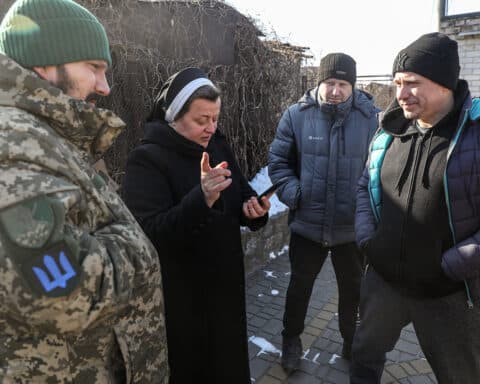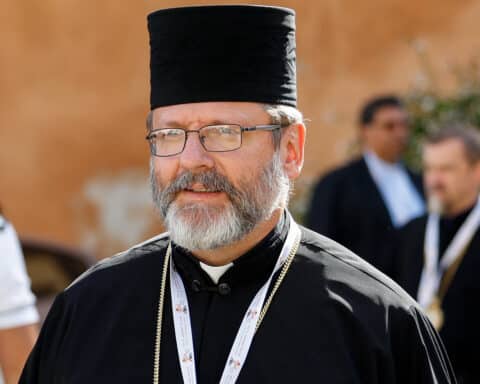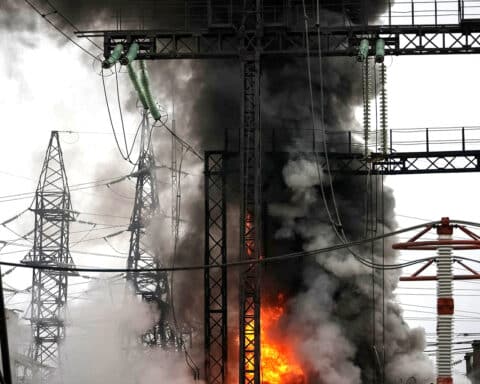After praying the weekly Sunday Angelus on Sept. 15, Pope Francis said that he continues to pray “for a rapid end to the conflict and for lasting peace in eastern Ukraine,” and he commented joyfully on the recent exchange of prisoners of war between Russia and Ukraine.
But according to the Ukrainian Greek-Catholic bishops, along with prayer, what could silence the arms in the eastern regions of Ukraine would be a visit from Pope Francis.
“Ukraine is waiting for him, and we all remind the pope of this every time we meet him,” said His Beatitude Sviatoslav Shevchuk, the Major Archbishop of the Ukrainian Greek Catholic Church.
The last meeting with the pope took place earlier this month, as the Synod of the Ukrainian Greek Catholic Church was held in Rome on Sept. 1-10, addressing the theme “Communion in life and in witness.”
“Ukraine is a great country, but the poorest country in Europe, especially now,” Archbishop Shevchuk told Our Sunday Visitor. “Secondly, Ukraine is a country hit by the war, where the greatest European humanitarian catastrophe has been underway since the Second World War. Thirdly, a new ecological catastrophe is imminent in Ukraine, following the Chernobyl Nuclear Disaster of 1986, which in a certain sense caused the Soviet Union collapse. Now, there is a new catastrophe, caused by war: water pollution.”
Poverty, peace and care of creation are also, according to the leader of the Ukrainian Greek-Catholic Church, “three marked sensibilities of Pope Francis,” noting, “this gives us hope to finally see Pope Francis in Ukraine.”
Ukranian conflict
The conflict in Ukraine began in 2014 when Russia annexed the Crimean Peninsula and began to support the pro-Russian separatists in the Donbass region, on the border between Ukraine and Russia. So far, there are more than 10,000 estimated deaths.
“Stopping an attacker like Russia is not easy,” Archbishop Shevchuk told OSV, using deliberately the word “attacker.” Hence, “a military solution to the conflict does not exist, that’s why everyone is looking for a diplomatic solution. The pope says that with war, you lose everything, with peace, you gain everything. We see that the pope’s visit to Ukraine could really silence the arms in the regions in eastern Ukraine.”
The first and so far only papal journey to Ukraine dates back to 2001 when Pope St. John Paul II visited Kiev, Lviv and Sykhiv on June 23-27. Ukraine had been an independent state for 10 years after the collapse of the Soviet Union. But relations with Russia continue to weigh heavily on Ukraine and the other former Soviet Republics.
His Beatitude Shevchuk, during his days spent in Rome, also had a private encounter with Pope Emeritus Benedict XVI, in his residence, Mater Ecclesiae, in the Vatican Gardens.
“Pope Benedict showed me his great concern about the militarization of Eastern European borders,” Shevchuk told OSV. “This situation awakens in him memories of the ages of First and Second World Wars. At the eastern European borders, there is a concentration of weapons never seen before. I speak of Crimea and the occupied part of eastern Ukraine, but also of the entire western border of Russia, namely the border with the Baltic countries, Poland and other states of the European Union. This situation scares those states because from this massive arsenal of weapons, a war could start. This is why the pope emeritus showed concern for us.”
Divided Church
On the hypothesis of a papal trip to Ukraine, Archbishop Shevchuk added that “this, too, we discussed with the Vatican Secretary of State Cardinal Pietro Parolin, especially what conditions would be necessary, especially considering the sensibility of the largest Church in the country, which is currently the Orthodox Patriarchate of Moscow. Therefore, on our part, a great openness exists. But we also want to satisfy previously all the conditions for such a trip.”
It is noteworthy that today in Ukraine three Orthodox churches coexist: the Church linked to the Moscow Patriarchate; the autocephalous Patriarchate of Ukraine, led by Metropolitan Epiphanius; and the non-canonical Kiev Patriarchate, led by “Honorary Patriarch” Filaret. The decision taken last year by the Ecumenical Patriarch of Constantinople Bartholomew to recognize the “autocephaly” (independence) of the Ukrainian Orthodox Church has provoked strong tensions between Constantinople and Moscow and between Ukrainian Orthodox faithful to Moscow and the autonomous ones.
This situation complicates, at the moment, an eventual trip of the pope to Ukraine, where even the Catholic Churches are two: the Latin and the Ukrainian Greek.
“But the essence of the Church is certainly not in these disputes. The essence of the Church is evangelization, as Pope Francis reminded us,” Archbishop Shevchuk said. “And also, Pope Benedict reminded us that suffering is also worthwhile for the unity of the Church.”
Deborah Castellano Lubov writes from Rome.

